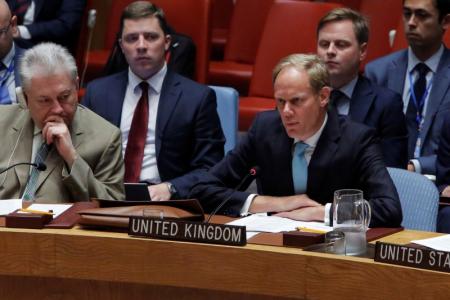
By Michelle Nichols
UNITED NATIONS (Reuters) – France and Britain are pressing to sanction those responsible for chemical weapons attacks in Syria, though Russia says it would not support a United Nations Security Council resolution.
An inquiry by the United Nations and the Organization for the Prohibition of Chemical Weapons (OPCW) found that Syrian government forces were responsible for three chlorine gas attacks and that Islamic State militants had used mustard gas.
French U.N. Ambassador Francois Delattre said on Tuesday that a draft resolution “sanctioning those responsible for the use of chemical weapons” was essentially ready and would be circulated to the 15-member council as soon as possible.
British U.N. Ambassador Matthew Rycroft said the draft resolution would “make sure that those members of the regime who were involved in that abhorrent use of chemical weapons in Syria will face the consequences.”
The inquiry found the Syrian government’s 253 and 255 squadrons, belonging to the 63rd helicopter brigade, were responsible for gas attacks and said that those “with effective control in the military units … must be held accountable.”
Russian U.N. Ambassador Vitaly Churkin said, however, there was “just not enough material proof to do anything” and described the French and British bid to impose sanctions as a “misplaced effort.”
“We wouldn’t support any action on this,” Churkin told reporters. He said the important thing was the council had earlier this month been able to extend the mandate of the inquiry for another year. He said Russia hoped that would serve as a deterrent.
Chlorine’s use as a weapon is prohibited under the Chemical Weapons Convention, which Syria joined in 2013. If inhaled, chlorine gas turns to hydrochloric acid and can kill by burning lungs and drowning victims in the resulting body fluids.
Syria agreed to destroy its chemical weapons in 2013 under a deal brokered by Moscow and Washington. The Security Council endorsed that deal with a resolution that said in the event of non-compliance, “including unauthorized transfer of chemical weapons, or any use of chemical weapons by anyone” in Syria, it would impose measures under Chapter 7 of the U.N. Charter.
Chapter 7 deals with sanctions and authorization of military force by the Security Council. The French/British draft could propose targeted sanctions – a travel ban and asset freeze – on people or entities linked to the attacks.
(Reporting by Michelle Nichols; editing by Grant McCool)











